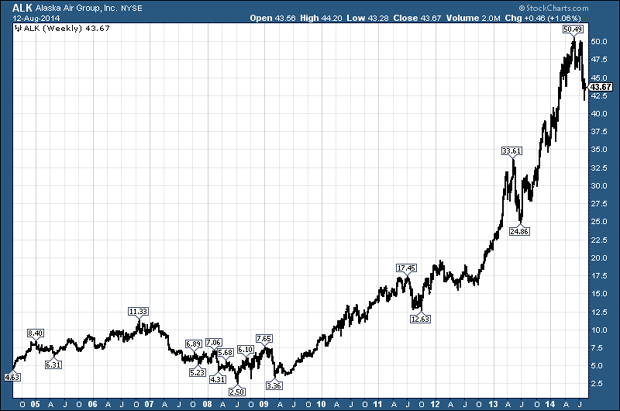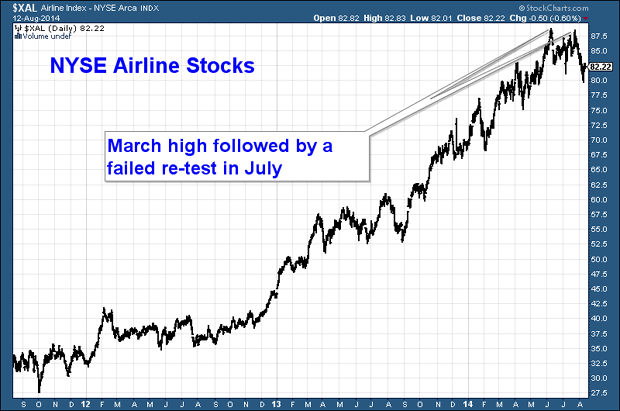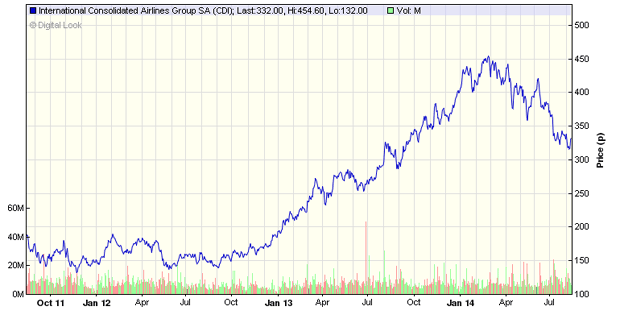Airline companies are regarded as the perennial dogs of the stock market.
But – and forgive the pun – over the past three years, they have positively soared.
However, I think they’ve gone about as high as they’re going to go, and they’re getting ready to come back down to earth.
Here’s why.
Airlines have been a cracking investment in recent years
‘Never own an airline stock’ – runs the maxim.
The problem I have with maxims is that they don’t always work.
You ‘buy when there’s blood on the streets’ – and the market falls another 25%.
You ‘buy the rumour, sell the news’ – and the market really does like the news, and rallies.
You ‘sell in May and go away’ – and the market has a bonanza summer.
The ‘never own an airline’ train of thought has its roots in airline stocks’ ugly history of underperformance.
The logic follows the underperformance.
Air travel is no longer a growing space (there are fewer people flying today than in 2008), so the only way for an airline to grow profits is to steal market share. The most effective way to do this (until somebody invents a superfast, supercheap passenger plane) is to slash prices, which eats into profit.
Most airlines lease planes, making it very hard to stand out from the other airlines who are, mostly, leasing the same planes. High regulation costs, taxation, the high cost of fuel, competition from budget airlines – these all make it very difficult for airlines to actually make money.
The industry is also vulnerable to external forces over which it has little control – not least terrorist attacks.
So it all makes perfect logical sense to follow the maxim, ‘never own an airline’.
And yet, the companies have, on the whole, been getting their acts together. Tighter ships are being run, the worst have gone out of business, there have been mergers – American Airlines even paid its first dividend this year since 1980.
So if you’d been avoiding airlines, you’d have missed out on one of the best-performing sectors of the last three years.
Take British Airways – or as it is now sexily known – International Consolidated Airlines Group (LSE: IAG). In roughly three years, it went from below 150p a share to 450p in March.
Or Lufthansa (XE:LHA): from €8 in late 2011 to €20 in March.
Or maybe Continental (NYSE: UAL): from $3 in summer 2009 to $30 in late 2011. And then from $15 in late 2011 to $49 in March of this year!
And how about the not-so-well known Alaskan Air Group (NYSE: ALK)? $2.50 in 2008, $50 earlier this year. Newsletter writer Dave Skarika pinged me the chart a fortnight ago and I couldn’t believe what I was seeing:

Airlines have soared.
And here’s a contrarian indicator, if ever there was one: you can’t just buy or sell airlines in the way that you would just about any other sector.
There is no airline exchange-traded fund (ETF). There used to be. Direxion closed its airline ETF in 2011 after it attracted only $2m in investment (a classic bottom of the market signal, perhaps).
This left only the Guggenheim Airlines ETF, and it had the same problem: it couldn’t attract investment. That was closed in March 2013 – right in the middle of a 150% tear in airline stocks.
Since it closed, the NYSE Arca Global Airline Index, which the ETF tracked, is up around 60%, compared to 28% for the S&P 500.
Perhaps we should wait for the next airline ETF to launch before shorting.
Or perhaps not.
If you’re feeling bold, shorting the airlines looks a good bet
‘What goes up must come down’. That’s another maxim for you. True when it’s true – and not when it’s not.
Below is a chart of the NYSE Arca Global Airline Index since late 2011. It’s been a heck of a run.
You can see it peaked in March. That high was re-tested in July and the re-test failed, since when the index appears to have reversed.
I think there’s a chance this bullish trend could be reversing.

March this year also happens to be when CNBC’s Jim Cramer – perhaps the world’s best-paid stock pundit – declared: “I am going to do something unprecedented here on Mad Money. I’m going to recommend the stock of an airline, an industry I have outright hated for at least ten years.”
That recommendation appears to have nailed the high.
To be fair to Cramer, the stock he tipped – American Airlines (Nasdaq: AAL) – rallied by another 10%, with the market still elated after its merger with US Airways. But then it began its slide.
If the price action does reverse and airlines start trending lower, it won’t take a lot for all the usual ghosts that have haunted airlines to appear and give people reasons to sell.
My view is that the sector is looking weak. Given the rises we have seen in recent years, it has the potential to fall a lot lower.
Take International Consolidated Airlines Group. Here’s the chart. Look at the price action over the last six months. It is clearly trending lower.

So if you’re holding onto airline stocks, I’d consider taking any profits you’ve made. Or at least tighten your stop-losses in case this market really is trending down.
If you’re interested in shorting the sector, the problem, as I say, is that there is no ETF. You have to pick stocks. The biggest opportunities might be those companies that have enjoyed the most dramatic rises.
The obvious place to put a stop is just above the March-July highs – then move it lower as things decline.
Delta Air Lines (NYSE: DAL), for example, was just $8 in September 2013. It hit $42 in June. There’s a long way for it to fall.
The simplest way to play this is via a spread bet. But you could also investigate put options. Whichever you decide, the most vital point to remember is – manage your risk. Shorting stocks is dangerous.
Finally, on a completely different topic – if you want to get your name in the back of my Bitcoin book, we go to press very soon – so sign up now.
Category: Market updates

